Taoyuan, Taiwan
Taoyuan[upper-roman 1] (/ˌtaʊjuːˈɛn/) is a special municipality of the Republic of China (Taiwan) located in northwestern Taiwan, neighboring New Taipei City to the north-east, Yilan County to the south-east, and Hsinchu County to the south-west. Taoyuan District is the seat of the municipal government and which, along with Zhongli District, forms a large metropolitan area. Taoyuan developed from a satellite city of Taipei metropolitan area to become the fourth-largest metropolitan area, and fifth-largest populated city in Taiwan. "Taoyuan" literally means "peach garden" in Chinese, since the area used to have many peach trees. Formerly a county, Taoyuan became the most recent special municipality in 2014.
Taoyuan City
| |
|---|---|
Special municipality | |
Clockwise from top: Taoyuan District skyline, Taoyuan International Airport, Lala Mountain, Yong'an Fishing Port, Taoyuan HSR station, Baroque architecture on Daxi Old Street, Shihmen Reservoir | |
 Flag  Logo | |
 | |
 | |
| Coordinates: 24°59′28.6″N 121°18′51.58″E | |
| Country | |
| Seat | Taoyuan District |
| Districts | 13
|
| Government | |
| • Body |
|
| • Mayor | Cheng Wen-tsan (DPP) |
| • Deputy Mayor | Chiu Tai-san[1] |
| Area | |
| • Special municipality | 1,220.95 km2 (471.41 sq mi) |
| • Urban | 1,140 km2 (440 sq mi) |
| • Rank | 14 of 22 |
| Population (July 2022)[4] | |
| • Special municipality | 2,266,824 |
| • Rank | 5 of 22 |
| • Density | 1,900/km2 (4,800/sq mi) |
| • Urban | 8,535,000 |
| • Urban density | 7,500/km2 (19,000/sq mi) |
| Time zone | UTC+8 (National Standard Time) |
| Postal code | 320-338 |
| ISO 3166 code | TW-TAO |
| Bird | Formosan blue magpie (Urocissa caerulea) |
| Flower | Peach blossom |
| Tree | Peach tree |
| Website | www |
| |
| Taoyuan City | |||||||||||||||||||||||||||||||
|---|---|---|---|---|---|---|---|---|---|---|---|---|---|---|---|---|---|---|---|---|---|---|---|---|---|---|---|---|---|---|---|
| Traditional Chinese | 桃園市 | ||||||||||||||||||||||||||||||
| Simplified Chinese | 桃园市 | ||||||||||||||||||||||||||||||
| |||||||||||||||||||||||||||||||
Taoyuan City is home to many industrial parks and tech company headquarters. Since commuting to the Taipei metropolitan area is easy, and its advantages of relatively low cost of living as well as less impacts by natural disasters in northern Taiwan, Taoyuan has had the fastest population growth of any city in Taiwan in recent decades.[6] The city is also a major destination for Taiwan's largest foreign worker population, many from Southeast Asia, with more than 116,000 in 2021.[7][8] Taoyuan International Airport, which serves the capital, Taipei and the rest of northern Taiwan, is located in this city.
History
Early history
In ancient times, the Taoyuan plateau was the home of the Taiwanese plains aborigines. In prehistory, the Ketagalan people settled in Nankan. In the early years of Dutch colonization, Spanish colonization, and Zheng He of the Ming Dynasty, there were no large-scale cultivation or industrial activities. During the Qing era, a number of people from Fujian Province and Guangdong province began to immigrate into present-day Taoyuan to develop and farm the land. They planted peach trees, which, when fully bloomed in spring, were so beautiful that the people named the land Toahong (Chinese: 桃仔園; pinyin: Táozǐyuán; Pe̍h-ōe-jī: Thô-á-hn̂g; lit. 'peach orchard').
Empire of Japan

In November 1901, during Japanese era, a local administrative office, Toshien Chō (Japanese: 桃仔園廳), was established in the area, and renamed Tōen Chō (桃園廳) in 1905. In 1920, the Tōen area was incorporated into Shinchiku Prefecture.
During the Japanese era, the staged migration policy caused Taoyuan to develop into a city with a variety of cultures. For example, temples and worship paths (currently the Taoyuan Martyrs Shrine) symbolized cultural systems. Butokuden (武德殿) were used to represent military systems, and the old Taoyuan City Office signified political systems.
Republic of China
After the transfer from Japan to the Republic of China, the present day-area of Taoyuan City was incorporated under Hsinchu County. In 1950, Taoyuan County was established by separating it from Hsinchu County. On 21 April 1971, Taoyuan City was made the county seat of Taoyuan County. It had 6 cities, 1 urban township and 6 rural townships.
In June 2009, the Executive Yuan approved the plan to upgrade Taoyuan from a county to a special municipality.[9] On 25 December 2014, Taoyuan County was upgraded into a special municipality of Taoyuan City (桃園市).
Geography
Taoyuan is located approximately 40 km (25 mi) southwest of Taipei, in northern Taiwan, and occupies 1,220 km2 (470 sq mi). It is made up of low-lying plains, interconnected mountains and plateaus. Its shape has a long and narrow southeast-to-northwest trend, with the southeast in the Xueshan Range and the far end on the shores of the Taiwan Strait.
There are many irrigation ponds at Taoyuan Plateau, which caused Taoyuan to earn the nickname "Thousand-pond Township" (千塘之鄉).[10]
Climate
Taoyuan has a humid subtropical climate, with mild to warm winters and hot summers, typical of northern Taiwan.
(The climate data of Taipei City is shown below for reference due to the city's proximity to Taipei.)
| Climate data for Taipei (1981–2010) | |||||||||||||
|---|---|---|---|---|---|---|---|---|---|---|---|---|---|
| Month | Jan | Feb | Mar | Apr | May | Jun | Jul | Aug | Sep | Oct | Nov | Dec | Year |
| Average high °C (°F) | 19.1 (66.4) |
19.6 (67.3) |
22.1 (71.8) |
25.7 (78.3) |
29.2 (84.6) |
32.0 (89.6) |
34.3 (93.7) |
33.8 (92.8) |
31.1 (88.0) |
27.5 (81.5) |
24.2 (75.6) |
20.7 (69.3) |
26.6 (79.9) |
| Daily mean °C (°F) | 16.1 (61.0) |
16.5 (61.7) |
18.5 (65.3) |
21.9 (71.4) |
25.2 (77.4) |
27.7 (81.9) |
29.6 (85.3) |
29.2 (84.6) |
27.4 (81.3) |
24.5 (76.1) |
21.5 (70.7) |
17.9 (64.2) |
23.0 (73.4) |
| Average low °C (°F) | 13.9 (57.0) |
14.2 (57.6) |
15.8 (60.4) |
19 (66) |
22.3 (72.1) |
24.6 (76.3) |
26.3 (79.3) |
26.1 (79.0) |
24.8 (76.6) |
22.3 (72.1) |
19.3 (66.7) |
15.6 (60.1) |
20.4 (68.7) |
| Average rainfall mm (inches) | 83.2 (3.28) |
170.3 (6.70) |
180.4 (7.10) |
177.8 (7.00) |
234.5 (9.23) |
325.9 (12.83) |
245.1 (9.65) |
322.1 (12.68) |
360.5 (14.19) |
148.9 (5.86) |
83.1 (3.27) |
73.3 (2.89) |
2,405.1 (94.68) |
| Average rainy days (≥ 0.1) | 14.1 | 14.6 | 15.5 | 14.9 | 14.8 | 15.5 | 12.3 | 14 | 13.8 | 11.9 | 12.4 | 11.7 | 165.5 |
| Average relative humidity (%) | 78.5 | 80.6 | 79.5 | 77.8 | 76.6 | 77.3 | 73 | 74.1 | 75.8 | 75.3 | 75.4 | 75.4 | 76.6 |
| Mean monthly sunshine hours | 80.6 | 71.3 | 89.6 | 92.6 | 113.7 | 121.7 | 179 | 188.9 | 153.7 | 124 | 99.4 | 90.7 | 1,405.2 |
| Source: Central Weather Bureau[11] | |||||||||||||
Ethnic composition
| Year | Pop. | ±% |
|---|---|---|
| 1985 | 1,211,249 | — |
| 1990 | 1,355,175 | +11.9% |
| 1995 | 1,524,127 | +12.5% |
| 2000 | 1,732,617 | +13.7% |
| 2005 | 1,911,161 | +10.3% |
| 2010 | 2,002,060 | +4.8% |
| 2015 | 2,105,780 | +5.2% |
| 2020 | 2,252,835 | +7.0% |
| Source:"Populations by city and country in Taiwan". Ministry of the Interior Population Census. | ||
| Year | 1981 | 1982 | 1983 | 1984 | 1985 | 1986 | 1987 | 1988 | 1989 | 1990 |
|---|---|---|---|---|---|---|---|---|---|---|
| Population | 1,093,621 | 1,129,576 | 1,160,709 | 1,189,752 | 1,211,249 | 1,232,209 | 1,259,503 | 1,288,626 | 1,320,359 | 1,355,175 |
| Year | 1991 | 1992 | 1993 | 1994 | 1995 | 1996 | 1997 | 1998 | 1999 | 2000 |
| Population | 1,385,165 | 1,415,546 | 1,448,186 | 1,483,955 | 1,524,127 | 1,570,456 | 1,614,471 | 1,650,984 | 1,691,292 | 1,732,617 |
| Year | 2001 | 2002 | 2003 | 2004 | 2005 | 2006 | 2007 | 2008 | 2009 | 2010 |
| Population | 1,762,963 | 1,792,603 | 1,822,075 | 1,853,029 | 1,880,316 | 1,911,161 | 1,934,968 | 1,958,686 | 1,978,782 | 2,002,060 |
| Year | 2011 | 2012 | 2013 | 2014 | 2015 | 2016 | 2017 | 2018 | 2019 | 2020 |
| Population | 2,013,305 | 2,030,161 | 2,044,023 | 2,058,328 | 2,105,780 | 2,147,763 | 2,188,017 | 2,220,872 | 2,249,037 | 2,245,162 |
| Year | 2021 | |||||||||
| Population | 2,272,391 | |||||||||
Hoklo
As of most of the cities and urban towns of Taiwan, Minnan people (Hoklos) are one of the largest ethnic groups of Taoyuan, most of whom live in northern Taoyuan (北桃園) which comprises the northern districts of Taoyuan, including Taoyuan city centre, Bade, Daxi, Dayuan, Guishan and Luzhu, and the city seat of government, Taoyuan District citycentre.
Hakka
The Hakka are the second-largest ethnic group in the city after the Minnan ethnicity (Hoklo) who won against the Hakkas in clan wars moved to the poor mountainous regions in southern Taoyuan, most of the Hakka peasants live in the rural peasant village areas of southern Taoyuan (南桃園), which includes Zhongli, Pingzhen, Yangmei, Longtan, Guanyin and Xinwu districts. With more than 785,000 Hakka people, Taoyuan hosts the largest Hakka population among all of Taiwan's administrative divisions.
Waishengren
After the Chinese Civil War, many people from mainland China (unaffectionately referred to as "Waishengren") settled in the then-Taoyuan County after the retreat of the nationalist government in 1949. Most of them live in military dependents' villages in Zhongli, Pingzhen and Guishan. Longgang is well known for its immigrants from Yunnan, featuring many Yunnan-style restaurants.
Aborigines
Most Taiwanese aborigines in the city live in Fuxing District, with most of them belonging to the Atayal people.
Economy
Taoyuan is one of the Taiwan's top industrial and technological cities. High-tech companies including Quanta, MiTAC, Inotera, Nanya Technology, HTC, CPT and AU Optronics have all opted to build or expand their factories in Taoyuan. Taoyuan has now become a bastion of electronics and semiconductor manufacturing. Over 200 of Taiwan's top 500 manufacturing companies have factories in Taoyuan. Taoyuan has also led Taiwan in terms of industrial output for nine straight years.
There are now 29 (registered) industrial areas with 3,696 ha (9,130 acres) of non-urban industrial land and 3,131 ha (7,740 acres) of urban industrial land. There are over 6,827 ha (16,870 acres) of land available for factories and industrial use in the city, representing the fact that Taoyuan's development bureau is based on industry and commerce. There are also 9 sites (57 ha; 140 acres) for mixed industrial-commercial use, the most of any county and city in Taiwan.[12]
On 26 March 2010, China Airlines (Taiwan's government-owned airline) moved into its new headquarters on the grounds of Taipei Taoyuan International Airport and in Dayuan Township in Taoyuan County (now Dayuan District, Taoyuan).[13][14] EVA Air maintains its headquarters in Luzhu District.[15] Evergreen Airlines Services Corporation, Evergreen Aviation Technologies Corp., and Evergreen Air Cargo Services Corporation, subsidiaries of Evergreen Group, are headquartered in Dayuan.[16][17][18]
On 25 December 2016, The Asia Silicon Valley Development Agency (ASVDA) was inaugurated in northern Taoyuan City, in a governmental effort to foster innovation, promote the Internet of Things (IoT) sector and attract top-class technology talent. The Asian Silicon Valley project aimed to transform Taiwan into an R&D hub for the IoT sector as well as a global center of entrepreneurship.[19]
Administration

.png.webp)
Taoyuan City is divided into 12 municipal districts and 1 mountain indigenous district.[20][21][22] The city government is located within Taoyuan District.
| Type | Name | Chinese | Taiwanese | Hakka | Formosan | Area (km2) | Population |
|---|---|---|---|---|---|---|---|
| District | Bade | 八德區 | Pat-tek | Pat-tet | 33.71 | 187,848 | |
| Daxi | 大溪區 | Tāi-khe | Thai-hâi | 105.14 | 93,388 | ||
| Dayuan | 大園區 | Tōa-hn̂g | Thai-yèn | 87.39 | 85,667 | ||
| Guanyin | 觀音區 | Koan-im | Kôn-yîm | 87.98 | 64,845 | ||
| Guishan | 龜山區 | Ku-soaⁿ | Kuî-sân | 72.01 | 145,706 | ||
| Longtan | 龍潭區 | Liông-thâm | Liùng-thâm | 75.23 | 118,648 | ||
| Luzhu | 蘆竹區 | Lô·-tek | Lù-tsuk | 75.50 | 155,626 | ||
| Pingzhen | 平鎮區 | Pêng-tìn | Phìn-tsṳ́n | 47.75 | 218,290 | ||
| Taoyuan | 桃園區 | Thô-hn̂g | Thò-yèn | 34.80 | 427,815 | ||
| Xinwu | 新屋區 | Sin-ok | Sîn-vuk | 85.02 | 48,469 | ||
| Yangmei | 楊梅區 | Iûⁿ-mûi | Yông-muì | 89.12 | 161,301 | ||
| Zhongli | 中壢區 | Tiong-le̍k | Chûng-la̍k | 76.52 | 390,251 | ||
| Mountain indigenous district |
Fuxing | 復興區 | Ho̍k-heng | Fu̍k-hîn | PyasanAtayal | 350.78 | 10,932 |
Colors indicate the common language status of Hakka and Formosan languages within each division.
Prior to its upgrade to become municipality on 25 December 2014, Taoyuan County used to have 6 county-administered cities (Bade, Luzhu, Pingzhen, Taoyuan, Yangmei, Zhongli), 1 urban township (Daxi), 5 rural townships (Dayuan, Guanyin, Guishan, Longtan, Xinwu), and 1 Mountain indigenous township (Fuxing).
Tourism

Shimen Reservoir
Shihmen Reservoir is one of Taiwan's major reservoirs. Once the largest water conservancy project in Southeast Asia, visitors may find many restaurants open near the reservoir serving fresh reservoir fish delicacies. There is also a three-kilometre-long (1.9 mi) bikeway surrounding the back pond. Shimen Reservoir provides almost all of the water in Taoyuan, as well as to New Taipei City's Xinzhuang, Banqiao, and Linkou districts.
Daxi Old Street
Daxi Old Street is one of the more famous Taiwanese old streets. It used to be a bustling hub for camphor and the tea trade, filled with diverse stores with façades designed in a Baroque style. The street also has the Daxi Wood Art Ecomuseum, which includes buildings such as Daxi Butokuden and Lee Teng-fan's Ancient Residence.
Cihu Mausoleum
Cihu Mausoleum is the final resting place of the former president of the Republic of China, Chiang Kai-shek.
Window on China Theme Park
The Window on China Theme Park is one of Taiwan's earliest theme parks, established in 1984. The park consists of three areas: Mini World, Water Park, and Amusement Park. The park features numerous small-scale replicas of many famous world landmarks.
Lala Mountain
Lala Mountain is one of Taiwan's "natural protection zones," including 500- to 2,800-year-old divine trees and the "No. 5 Divine Tree," which predates Confucius.
Furen Temple
Furen Temple was established in 1813, dedicated to Kai Zhang Sheng Wang and the temple is located along Daxi Old Street in Daxi District.
Tianhou Temple
Tianhou Temple was established in 1826, and is located in Xinwu District. The temple built a magnificent bronze statue of Goddess Mazu in 2002, which is the 2nd-tallest statue of Mazu in Taiwan and the 3rd-tallest in the world.
Taoyuan Martyrs' Shrine
Taoyuan Martyrs' Shrine is one of the best-kept Shinto shrines outside Japan.
Longgang Mosque
The Longgang Mosque in Zhongli District is Taiwan's fifth mosque. It was originally built in 1967 to serve an area with many Taiwanese Muslims.
Taoyuan Aquarium X PARK
X PARK is a public aquarium operated by Yokohama Hakkeijima. The Taiwanese sea-themed tank "Formosa" is popular.
 Shihmen Reservoir
Shihmen Reservoir Cihu Mausoleum of Chiang Kai-shek
Cihu Mausoleum of Chiang Kai-shek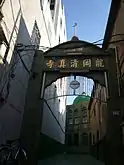 Longgang Mosque
Longgang Mosque
Government and politics
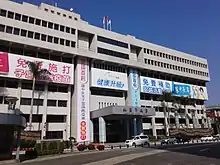

Mayor

In 2001, Eric Chu of the Kuomintang defeated Democratic Progressive Party incumbent Peng Shao-Chin in the race for Taoyuan County magistrate. Peng had inherited the magistrate position after Annette Lu vacated the post to serve as vice president. Chu ran for re-election in 2005 and defeated DPP challenger Pao-Ching Cheng, CEO of the Taiwan Salt Company.
In 2009, John Wu of the KMT defeated his DPP opponent, Cheng Wen-tsan and became the Magistrate of Taoyuan County.
After the upgrade of Taoyuan County to Taoyuan City, Cheng Wen-tsan of the DPP won the 2014 Taoyuan City mayoralty election, on 29 November 2014, and became the city's first mayor, starting 25 December 2014.[23]
1996 presidential election
A majority of Taoyuan County residents voted for eventual winner Lee Teng-hui and vice president Lien Chan.
2000 presidential election
| Party | Candidate | Votes | Percentage | ||
|---|---|---|---|---|---|
| President | Vice President | ||||
| Independent | James Soong | Chang Chau-Hsiung | 413,370 | 43.83% | |
| Kuomintang | Lien Chan | Vincent Siew | 208,881 | 22.15% | |
| New Party | Li Ao | Elmer Fung | 1,140 | 0.12% | |
| Independent | Hsu Hsin-liang | Josephine Chu | 20,581 | 2.18% | |
| Democratic Progressive Party | Chen Shui-bian | Annette Lu | 299,120 | 31.72% | |
2004 Presidential election
| Party | Candidate | Votes | Percentage | ||
|---|---|---|---|---|---|
| President | Vice President | ||||
| Democratic Progressive Party | Chen Shui-Bian | Annette Lu | 448,770 | 44.68% | |
| Kuomintang | Lien Chan | James Soong | 555,688 | 55.32% | |
2008 presidential election
| Party | Candidate | Votes | Percentage | ||
|---|---|---|---|---|---|
| President | Vice President | ||||
| Democratic Progressive Party | Frank Hsieh | Su Tseng-Chang | 379,416 | 35.36% | |
| Kuomintang | Ma Ying-jeou | Vincent Siew | 693,602 | 64.64% | |
2012 presidential election
| Party | Candidate | Votes | Percentage | ||
|---|---|---|---|---|---|
| President | Vice President | ||||
| Democratic Progressive Party | Tsai Ing-Wen | Su Jia-chyuan | 445,308 | 39.85% | |
| Kuomintang | Ma Ying-jeou | Wu Den-yih | 639,151 | 57.20% | |
| Independent (or seen as PFP) | James Soong | Lin Ruey-shiung | 32,927 | 2.95% | |
2016 presidential election
| Party | Candidate | Votes | Percentage | ||
|---|---|---|---|---|---|
| President | Vice President | ||||
| Democratic Progressive Party | Tsai Ing-Wen | Chen Chien-jen | 547,573 | 51.03% | |
| Kuomintang | Eric Chu | Wang Ju-hsuan | 369,013 | 34.39 | |
| People First Party | James Soong | Hsu Hsin-ying | 156,518 | 14.59 | |
2020 presidential election
| Party | Candidate | Votes | Percentage | ||
|---|---|---|---|---|---|
| President | Vice President | ||||
| Democratic Progressive Party | Tsai Ing-Wen | William Lai | 718,260 | 54.78% | |
| Kuomintang | Han Kuo-yu | Chang San-cheng | 529,749 | 40.40% | |
| People First Party | James Soong | Sandra Yu | 63,132 | 4.81% | |
Education

_NDU_side_gate_on_Shingfeng_Road.jpg.webp)

Public universities
- Central Police University
- National Central University
- National Defense University
- National Taiwan Sport University
Private universities
- Chang Gung University
- Chung Yuan Christian University
- Kainan University
- Yuan Ze University
Technical and vocational universities
- Chien Hsin University of Science and Technology
- Lunghwa University of Science and Technology
- Vanung University
Military Academies
- Army Academy R.O.C.
- Republic of China Army Communication, Electronics and Information School
- Republic of China Army Chemical School
- Republic of China Army Logistics School
- Republic of China Military Police School
Public high schools
- The Affiliated Jhongli Senior High School of National Central University[24]
- Taoyuan Municipal Nei Li Senior High School
- Taoyuan Municipal Taoyuan Senior High School
- Taoyuan Municipal Yang Mei Senior High School
- Taoyuan Municipal Yang Ming Senior High School
- Taoyuan Municipal Wu-Ling Senior High School
- Taoyuan Municipal Dasi Senior High School
- Taoyuan Municipal Dayuan International Senior High School[25]
- Taoyuan Municipal Nankan Senior High School
- Taoyuan Municipal Pingjen Senior High School
- Taoyuan Municipal Shoushan Senior High School
- Taoyuan Municipal Yung-Feng High School
- Taoyuan Municipal Yungfong Senior High School
- Taoyuan Municipal Xinwu High School
- Taoyuan Municipal Longtan Senior High School
- Taoyuan Municipal LuoFu Senior High School
- Taoyuan Municipal Guanyin High School
Industry and environment
A former RCA facility is located in the city. The RCA facility is the source of significant trichloroethylene contamination.
Sports
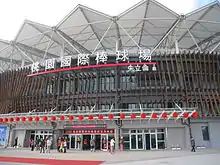
The Taoyuan International Baseball Stadium is home to the Rakuten Monkeys of the Chinese Professional Baseball League (CPBL).
The Taoyuan County Stadium, built in 1993, is a multi-use stadium used mostly for football matches that also has an athletics track. The stadium has a capacity of 30,000 spectators.[26] It is within walking distance southwest from Taoyuan Senior High School Station of the Taiwan Railway Administration.
The Taoyuan Arena, also built in 1993, is an indoor sporting arena located in Taoyuan District. The concept of its roof structure was based on the bicycle structure, the outer ring (to bear pressure) and inner tire (to bear tensile strength) of the bicycle wheels are connected by cable wires. It occupies an area of 1.5 hectares (3.7 acres) with a capacity of 15,000 spectators.[27] It is used to host indoor sporting events, such as basketball and volleyball.
The then-Taoyuan County is also the birthplace of Taiwanese professional golfer Yani Tseng and taekwondo athlete Chu Mu-Yen.
Recent major sporting events held by Taoyuan include:
Notable person
- Yani Tseng (Guishan District)
- Jerry Yan
- Cheng Wen-tsan (Bade District)
Transportation




Rail
- Taiwan Railways Administration Western Line(Taoyuan - Zhonglu - Taoyuan Hospital - Neili - Chungyuan - Zhongli - Pingzhen - Puxin - Yangmei - Fugang - Xinfu)
- Taiwan High Speed Rail
- Taoyuan Station is located at the Qingpu (青埔) area, in Zhongli District.
Mass Rapid Transit
The rapid transit system of the city is Taoyuan Metro and is operational since April 2017.
- Lines and stations of the Taoyuan MRT System:
| Line | Termini | Length (km) | Total Length (km) | Status | |||
|---|---|---|---|---|---|---|---|
| Taoyuan Airport MRT | Taipei | Huanbei | 51.03 | 53.09 | In operation | ||
| Huanbei | Zhongli | 2.06 | Under construction | ||||
| Zhongli | Zhongli Sports Park | TBD | Planning | ||||
| Green | Main Line | Bade | Kengkou | 27.8 | 39.33 | Under construction | |
| Hengshan | |||||||
| Zhongli Extension | Bade | Zhongli Sports Park | 7.2 | Planning | |||
| Daxi Extension | Bade | Puding | 4.33 | Planning | |||
| Orange | Taoyuan-Pingzhen Line | Taoyuan Arena | TBD | 21 | 29 | Planning | |
| Pingzhen-Longtan Line | TBD | Longtan | 8 | Planning | |||
| Brown | Main Line | Taoyuan | Huilong | 11.38 | 15.28 | Planning | |
| Urban Extension | Taoyuan | Zhonglu | 3.9 | Planning | |||
| New Taipei Metro: Sanying Line |
Dingpu | Yingtao Fude | 14.29 | 18.17 | Under Construction | ||
| Yingtao Fude | Da'nan | 3.88 | Planning | ||||
Road
National Highway No. 1 and 3 are nearby and connect via local highways to the city itself. National Highway No. 2 connects to Taoyuan International Airport. Bridges in the city are Luofu Bridge.
Air
Taipei Taoyuan International Airport at Dayuan District is the largest airport in Taiwan. It serves as the main international hub for China Airlines and EVA Air. Taipei Taoyuan handled a total of 25,114,418 passengers in 2010. It is the fifteenth-busiest air freight hub in the world and thirteenth-busiest airport by international passenger traffic. Taipei Taoyuan International Airport currently has two terminals which are connected by two, short people movers. A third terminal and a rapid transit system linking the terminals together underground are currently under construction.
International relations
Twin towns – Sister cities
 Aur Atoll, Marshall Islands (2018)
Aur Atoll, Marshall Islands (2018) Hartford County, Connecticut, United States (1982)
Hartford County, Connecticut, United States (1982) Alameda County, California, United States (1977)
Alameda County, California, United States (1977)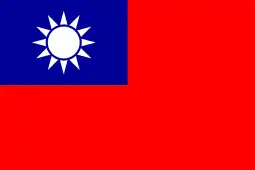 Miaoli City, Taiwan (2006)
Miaoli City, Taiwan (2006) Dallas County, Texas, United States (2007)
Dallas County, Texas, United States (2007) Incheon, South Korea (2009)
Incheon, South Korea (2009) Ramat Gan, Israel (2016)
Ramat Gan, Israel (2016) Kota Kinabalu, Malaysia (2017)[30][31]
Kota Kinabalu, Malaysia (2017)[30][31] Grenoble, France (2018)
Grenoble, France (2018) Miyazaki, Miyazaki, Japan (2018)
Miyazaki, Miyazaki, Japan (2018) Narita, Chiba, Japan (2016)
Narita, Chiba, Japan (2016)
See also
- Taoyuan–Zhongli metropolitan area
- Taoyuan International Airport
Notes
Words in native languages
-
- Traditional Chinese script: 桃園市
- Mandarin Pinyin: Táoyuán Shì
- Hokkien: Thô-hn̂g Tshī
- Sixian Hakka: Tǒ-iěn Sii
- Hailu Hakka: To-rhan Shi+
References
- "Cheng promises transparency after deadly fire - the China Post". Archived from the original on 8 November 2016. Retrieved 21 January 2015.
- 《中華民國統計資訊網》縣市重要統計指標查詢系統網 (in Chinese). Archived from the original on 12 June 2016. Retrieved 13 June 2016.
- "Demographia World Urban Areas PDF (April 2016)" (PDF). Demographia. Archived (PDF) from the original on 3 May 2018. Retrieved 13 June 2016.
- "404Error" 人口統計-桃園市政府民政局. cab.tycg.gov.tw (in Chinese). 7 March 2014. Archived from the original on 25 July 2016. Retrieved 6 June 2016.
{{cite web}}: Cite uses generic title (help) - "Demographia World Urban Areas PDF" (PDF). Demographia. Archived (PDF) from the original on 3 May 2018. Retrieved 30 November 2019.
- Yu Hsiang, Frances Huang (23 January 2021). "Taoyuan sees largest population growth among 6 municipalities in 2020". Focus Taiwan. Retrieved 17 March 2021.
- Syrena Lin (13 July 2021). "Between Miaoli and Taoyuan: Taiwan's Response to Migrant Worker Rights at an Intersection". The News Lens. Archived from the original on 14 July 2021. Retrieved 24 April 2022.
- Taiwan Today (30 November 2018). "Taoyuan wins international award for migrant worker program". Ministry of Foreign Affairs (Taiwan). Retrieved 24 April 2022.
- "Rezoning Taiwan". Taiwan Today. 1 February 2011. Retrieved 9 December 2020.
- 農田水利入口網. coa.gov.tw. Archived from the original on 5 January 2014. Retrieved 29 May 2012.
- "Climate". Central Weather Bureau. Archived from the original on 12 June 2017. Retrieved 27 December 2014.
- "2014 Department of Economic Development, Taoyuan City". edb.tycg.gov.tw. Archived from the original on 5 December 2019.
- "move.htm China Airlines. Retrieved on 15 March 2010". Archived from the original on 6 April 2010.
- "China Airlines Inaugurates CAL Park at Taoyuan Airport". Archived 14 October 2013 at the Wayback Machine China Airlines. 26 March 2010. Retrieved on 26 March 2010.
- "Evergreen Club". Archived 31 July 2009 at the Wayback Machine EVA Air. 24/28. Retrieved on 21 May 2009.
- "Contact Us". Evergreen Aviation Technologies Corp. Retrieved on 29 September 2009. Archived 5 July 2009 at the Wayback Machine
- "Contact Us" Archived 5 April 2009 at the Wayback Machine. Evergreen Airlines Services Corporation. Retrieved on 29 September 2009.
- "Company Location". Archived 22 August 2009 at the Wayback Machine Evergreen Air Cargo Services Corporation. Retrieved on 29 September 2009.
- "Asia Silicon Valley Development Agency launches in Taoyuan - New Southbound Policy Portal". New Southbound Policy. Archived from the original on 4 February 2018. Retrieved 3 February 2018.
- 臺灣地區鄉鎮市區級以上行政區域名稱中英對照表 (PDF). Online Translation System of Geographic Name, Ministry of Interior. 16 June 2011. p. 6. Archived from the original (PDF) on 25 March 2012.
- "Administrative Districts". Taoyuan City Government. 30 September 2017. Retrieved 16 June 2019.
- "404Error" 各區簡介. Taoyuan City Government. 13 June 2019. Retrieved 16 June 2019.
{{cite web}}: Cite uses generic title (help) - "2014 Local Elections". Archived from the original on 20 December 2014. Retrieved 26 December 2014.
- "歡迎來到國立中壢高級中學". Archived from the original on 11 September 2007. Retrieved 11 September 2007.
- "桃園縣立大園國際高級中學". Archived from the original on 25 March 2010. Retrieved 3 December 2009.
- "Football stadiums of the world – Stadiums in Asia - Football stadiums of the world". www.fussballtempel.net. Archived from the original on 15 October 2017. Retrieved 2 May 2016.
- "About us" 桃園市政府體育局. Department of Sports, Taoyuan. 26 July 2016. Archived from the original on 29 January 2018.
- "Archived copy". Archived from the original on 25 June 2011. Retrieved 7 June 2011.
{{cite web}}: CS1 maint: archived copy as title (link) - 中壢客運─租車 包車 遊覽車 旅行社 旅遊. www.chunglibus.com.tw (in Traditional Chinese). Archived from the original on 28 June 2011. Retrieved 7 June 2011.
- "Taoyuan-KK Friendship Pact proposed". Daily Express. 24 January 2017. Archived from the original on 16 March 2017. Retrieved 17 March 2017.
- Mary Chin (5 May 2017). "City and cultural pacts with Taipei soon". Daily Express. Archived from the original on 5 May 2017. Retrieved 6 May 2017.
External links
 Media related to Taoyuan City at Wikimedia Commons
Media related to Taoyuan City at Wikimedia Commons Taoyuan, Taiwan travel guide from Wikivoyage
Taoyuan, Taiwan travel guide from Wikivoyage- Official website
 (in English)
(in English)  Geographic data related to Taoyuan, Taiwan at OpenStreetMap
Geographic data related to Taoyuan, Taiwan at OpenStreetMap
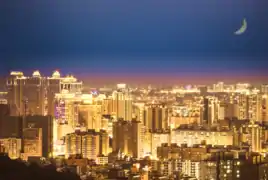

.jpg.webp)
.jpg.webp)


